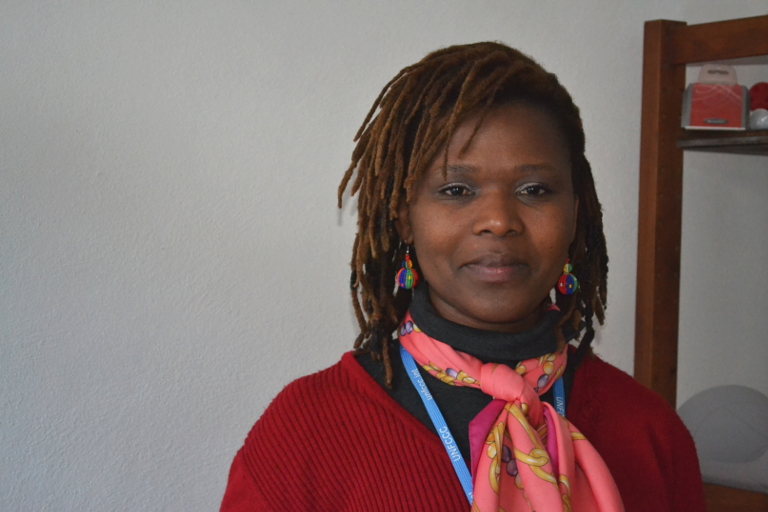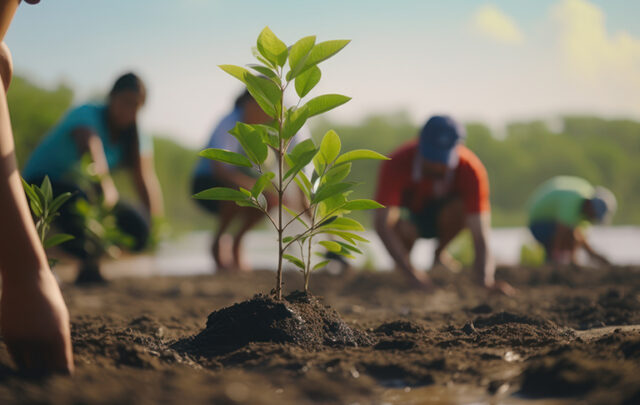Nonty Ntokozo Charity Sabic talks to Gesa Maschkowski – co-founder of Transition Initiative Bonn im Wandel – about the rising voice of indigenous people at COP23.
Nonty is bringing traditional Shamanic practices to the 21th century, she is advocating for immigrants in Europe and trying to build a bridge of healing and reconciliation between the North and the South. Nonty recently co-founded RISE, the Revivers of Indigenous Spirituality and Ecosystems. She visited COP23 as member of the advocacy group of the Global Ecovillage Network
Nonty, what attracted you to come to COP23 and what questions did you come with?
For me personally this is a great opportunity to create the space for people to come, discuss and really face the climate change issue, and bring in the facts and the data and the possibility of what we can do together to find solutions.
Yet my personal experience is that I question the grand scale of COP23. I question even the economy behind it and if this money could be used to actually implement the solutions that are needed.
I don´t feel that COP23 brings together all the stakeholders in a fair way, there is a lack of inclusivity and respect when it comes to the people who are directly affected in their lives by climate change, for example people who already live in the areas of fracking and mining in the North and people from the Global South.
An example of disrespect for me is seeing how much energy and how much money went into the buildings, but there is only a very small pavilion space for indigenous people. This is disregard for the real people who are directly affected by climate change. They should have given them a real space to hold bigger audiences, a bigger room for presentations and a space for dialogue where indigenous people can have forums among themselves and with ministers and governments. All the other pavilions had this spaces for dialogue.
And also the negotiations, they are still discussing about the Paris agreement. Why do they still talk about it and not act on it? There is a lack of responsibility from the countries from the north.
Moreover, there is still a gap we have not filled between climate change and economy. How will climate change affect our economy? Who exactly is holding the economy? Is it really affecting the economy or is it affecting companies who are benefitting from the continuity of raping mother earth?
What is the message you are bringing?
The message is coming from GEN: Living a sustainable lifestyle simple is better, not only for the planet but for the essence of community and for our own inner wellbeing. One cannot exist without the other. We use these four dimensions, the social, the economy, the culture and nature. One cannot exist without the other. Therefore let’s go back to the indigenous way, to the ways of the circle, let’s go back into creating community living together, creating new ways of governance which are different to the state of we have now, new ways of economy. Finding ways to adapt the old ways into the now.
What is needed from your point of view, to bring the climate negotiations forward?
First is that you really understand: Do we even need a conference? Do we need such a big scale event? What difference has it really made? What impact has it had towards climate change? It should be evaluated and the difference the conference has made to creating climate change solutions should be presented.
Then, I wonder if we shouldn´t instead create spaces for meetings between the big corporations, governments, people on the ground, grassroots movements, where they can really have space for dialogue, bringing in the scientific facts and bridging the gap between climate change and economy. Bring in all the stakeholders and find a common ground for how we move forward together, not separately. Everybody needs to sit at the table, it’s only one planet.
What were the things that inspired you?
I was inspired by different NGOs and different African countries. They are really affected and looking for solutions, they are really willing to do something on the ground and to go back to the sustainable living. For example to learn from the Ecovillage Movement, and what the next steps are that are needed to turn their villages into Ecovillages. There is lots of interest in renewable energy, biogas and so on.
Seeing that governments have to reach Sustainable Development Goals and need knowledge and tools on how to reach them. That really inspired me, to see people being interested in that. And also seeing the indigenous people from different countries coming out to speak, using scientific evidence – and to mobilize themselves not only by talking but also doing scientific research and economic research to understand how big corporations make money from destroying the planet. Climate Justice Alliance produced a book about that called Carbon Pricing – Critical Perspective for Community Resistance with five main recommendations.
“Carbon pricing, including carbon trading, carbon taxes and carbon offsets, are false solutions to climate change that do NOT keep fossil fuels in the ground …Token revenues distributed to environmental justice communities from carbon trading or carbon pricing can never compensate for the destruction wrought by the extraction and pollution that is the source of that revenue”.
There were also discussions about money from the northern countries given to the South. It creates a short term solution compared to the damage in the long run. But it’s very clear: leave the resource underground. The idea of scarcity is just a false idea to create fear. We have enough resources we have sun, water, earth.
I didn´t see the indigenous people from Africa and I am hoping in the future that there could be more cooperation from the indigenous people in the North, from the Amazon and from Africa.
What is your message for the people on the ground?
UBUNTU which is the concept the philosophy of “I am because we are”. We need to learn to coexist and create just communities. From that space we have group intelligence and we can conquer anything, going back to reconnect with mother earth and living with the planet. Then mobilize and work together.





